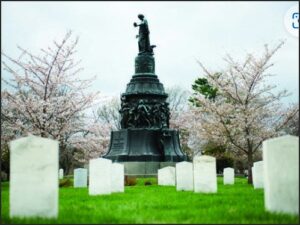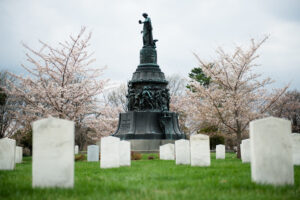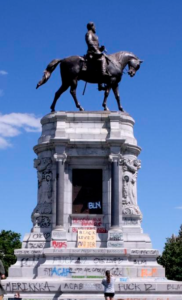 As controversy rages over the fate of the Moses Ezekiel statue at the Confederate Memorial in Arlington National Cemetery, The Cadet student newspaper at Virginia Military Institute quotes anonymous sources that the statue might be moved to the Virginia Museum of the Civil War at the New Market battlefield site. — JAB
As controversy rages over the fate of the Moses Ezekiel statue at the Confederate Memorial in Arlington National Cemetery, The Cadet student newspaper at Virginia Military Institute quotes anonymous sources that the statue might be moved to the Virginia Museum of the Civil War at the New Market battlefield site. — JAB
About
Bacon's Rebellion is Virginia's leading politically non-aligned portal for news, opinions and analysis about state, regional and local public policy. Read more about us here.Fund the Rebellion
Shake up the status quo!
Your contributions will be used to pay for faster download speeds and grow readership. Make a one-time donation by credit card or contribute a small sum monthly.
Can't wait until tomorrow for your Bacon's Rebellion fix?
Search Bacon’s Rebellion
Content Categories
Archives
The Jefferson Council: Protecting Thomas Jefferson’s Legacy at the University of Virginia

Want More Unfiltered News?
Check out the Bacon’s Rebellion News Feed, linking to raw and unexpurgated news and commentary from Virginia blogs, governments, trade associations, and advocacy groups.
Submit op-eds
We welcome a broad spectrum of views. If you would like to submit an op-ed for publication in Bacon’s Rebellion, contact editor/publisher Jim Bacon at jabacon[at]baconsrebellion.com (substituting “@” for “at”).
Forgot Your Password?
Shoot me an email and I'll generate a new password for you.-
Recent Posts
- Souped Up on the Mountain
- Whoops.
- Jeanine’s Memes
- Bacon Meme of the Week
- A Rejoinder on the TJ “Fall”
- Greedy Cities and Speeding Ticket Chicanery
- TJ High School Falls From 1st to 14th Place
- Freebees Aren’t Free
- Extensive Plagiarism Alleged for UVA PhD Dissertation
- Some Rural Localities Hit With Big Jump in Local Composite Index
- The Budget Do-Over: A Game of Chicken?
- Jason Miyares–Judicial Activist?
- State Legislatures Control Budgets — Virginia’s More Than Most
- Jeanine’s Memes
- Bacon Meme of the Week



 by Tyler O’Neil
by Tyler O’Neil 
 by Donald Smith
by Donald Smith 